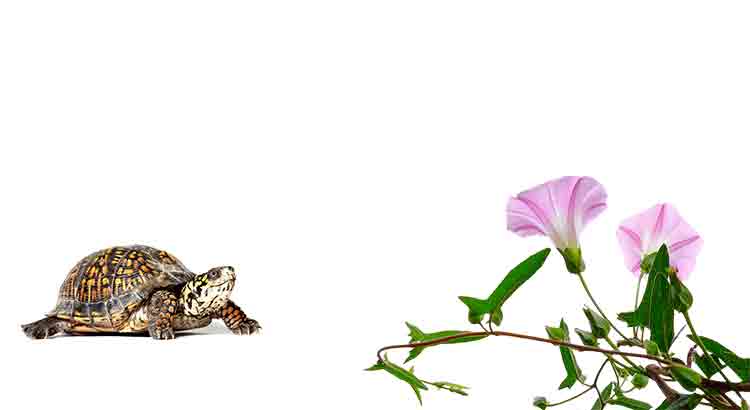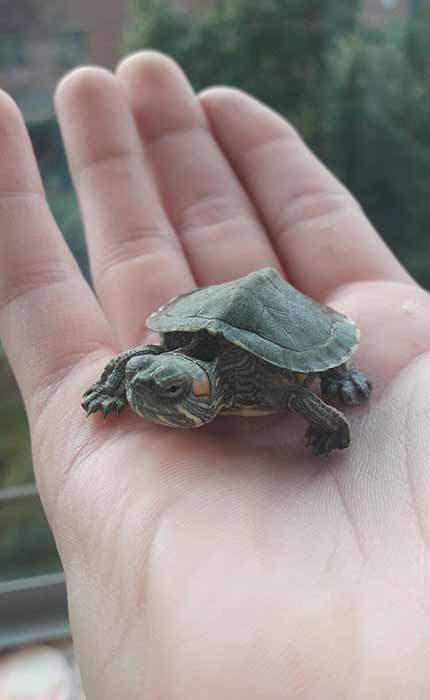Tortoises are known for eating everything that you put in front of them. This is generally a good thing since they won’t refuse the food you give them. But this can also be dangerous because they might eat some fruits or vegetables that are not so good for them. But is bindweed one of them?
Tortoises can eat bindweed, but should only eat very small quantities. Bindweed contains phosphorus which inhibits the absorption of calcium, which is essential for the good health of the shell.
So bindweed is not the best thing to feed your tortoise. But they are not the only thing that seems harmless at first but should actually be avoided, the same thing applies to a lot of vegetables.
What Else You Should Avoid Feeding Your Tortoise, Besides Bindweed
Almost all vegetables contain calcium and phosphorus. And as a result, most of them have a calcium to phosphorus ratio. So let’s take a look at what calcium does for tortoises, what phosphorus does for them, and what is good calcium to phosphorus ratio is.
Calcium is essential for every animal in this world that has bones. And since the shell of a tortoise is made out of bones, the calcium is even more important for tortoises than for any other animal. Vegetables are one of the main sources of calcium that a tortoise has, so making sure that you feed them vegetables with high amounts of calcium is important.
For humans phosphorus is a very important mineral that helps filter waste, repair tissue and cells, etc. But for tortoises phosphorus is not that great. Phosphorus is what gives tortoise shells a little flexibility, which is great because this little extra flexibility makes them more resistant to bites and other types of impact. But too much phosphorus can also make the shell a lot softer, and as a result much weaker when it comes to defending the tortoise from predators.
In short, we can say that calcium is great for tortoises and phosphorus is not so great for tortoises in high quantities.
Most vegetables have a calcium to phosphorus ratio, this ratio can be 1:1, 2:1, 5:1, 1:2, etc.
A 1:1 ratio means that the amount of calcium is equal, or almost equal to the amount of phosphorus. So a vegetable with this ratio is not that great for tortoises, but it’s not harmful either. But if possible such a vegetable should be avoided.
A 1:2 calcium to phosphorus ratio is bad, there are not many vegetables with this ratio, so don’t worry too much about them. Just remember that if a vegetable has more potassium than calcium you should keep it away from your tortoise.
A 2:1 ratio is great, and this is what you should be aiming for, if the ratio goes higher it’s ok, but ideally this is the ratio that you are looking for.
Table With the Most Common Vegetables and Their Calcium to Phosphorus Ratio
Here is a list of some of the most common vegetables and their Calcium to Phosphorus ratios:
| Collards | 14.5:1 |
| Spinach, Mustard | 7.5:1 |
| Turnip Greens | 4.5:1 |
| Lambsquarters | 4.3:1 |
| Dill Weed | 3.2:1 |
| Beet Greens | 3.0:1 |
| Dandelion Greens | 2.8:1 |
| Chinese Cabbage (pak-choi) | 2.8:1 |
| Lettuce, Loose leaf | 2.7:1 |
| Mustard Greens | 2.4:1 |
| Parsley | 2.4:1 |
| Kale | 2.4:1 |
| Chicory Greens | 2.1:1 |
| Spinach | 2.0:1 |
| Watercress | 2.0:1 |
| Cabbage | 2.0:1 |
| Endive (Escarole) | 1.9:1 |
| Celery | 1.6:1 |
| Purslane | 1.5:1 |
| Cilantro | 1.4:1 |
| Lettuce, Butterhead (Boston, Bibb) | 1.4:1 |
| Okra | 1.3:1 |
| Swiss Chard | 1.1:1 |
| Turnip | 1.1:1 |
| Squash (Winter, all varieties) | 1.0:1 |
| Green Beans | 1.0:1 |
| Lettuce, Romaine | 0.8:1 |
| Sweet Potato | 0.8:1 |
| Rutabaga | 0.8:1 |
| Broccoli | 0.7:1 |
| Cucumber (with skin) | 0.7:1 |
| Endive, Belgian (Witloof Chicory) | 0.7:1 |
| Carrots | 0.6:1 |
| Squash (Summer, all varieties) | 0.6:1 |
| Brussels Sprouts | 0.6:1 |
| Cauliflower | 0.5:1 |
| Kohlrabi | 0.5:1 |
| Pumpkin | 0.5:1 |
| Alfalfa Sprouts | 0.5:1 |
| Parsnips | 0.5:1 |
| Peppers, Green | 0.5:1 |
| Peppers, Red | 0.5:1 |
| Sweet Potato Leaves | 0.4:1 |
| Beets | 0.4:1 |
| Asparagus | 0.4:1 |
| Tomato | 0.2:1 |
| Corn, White | 0.02:1 |
With the help of this table you should be able to get a general idea of what vegetables you should feed your tortoise. I personally like to feed my tortoise Greenleaf and Redleaf salad, they are not too expensive and he seems to like it. And when I’m cooking something with vegetables I usually cut a couple of smaller pieces and feed them to my tortoise, just to mix things up a little.
Fruits are somewhat similar to vegetables, so they also contain phosphorus and should be eaten by tortoises in moderation. If you want to know which fruits are good for tortoises and which are bad you can check out this article where I discuss this subject in depth: Can Tortoises Eat Fruits? (How Much, How Often + List)
Safe Plants That You Can Feed Your Tortoise
The list of plants that you should avoid giving your tortoise is quite big, so instead of looking at those we will look at the ones that you can give to your tortoise, as this list is shorter. If you don’t find a plant on this list then most likely you should avoid feeding it to your tortoise.
Plants that are safe for tortoises:
- Lemon Balm
- Plantain
- Mulberry
- Clover
- Chickweed
- Aloe Vera
- Self-Heal
- Campanula
- Dock Leaves
- Red Sorrel
As you can imagine there are more plants that tortoises can eat safely, but those are the most common.
Final Thoughts
So bindweed is not the best option for your tortoise. But bindweed is just one of the hundreds of plants that you can feed your tortoise, there are many healthier options out there.
I hope this article answered all of your questions, but in case you still have questions left, you can always leave them in the comment section and I will answer them as soon as possible.


